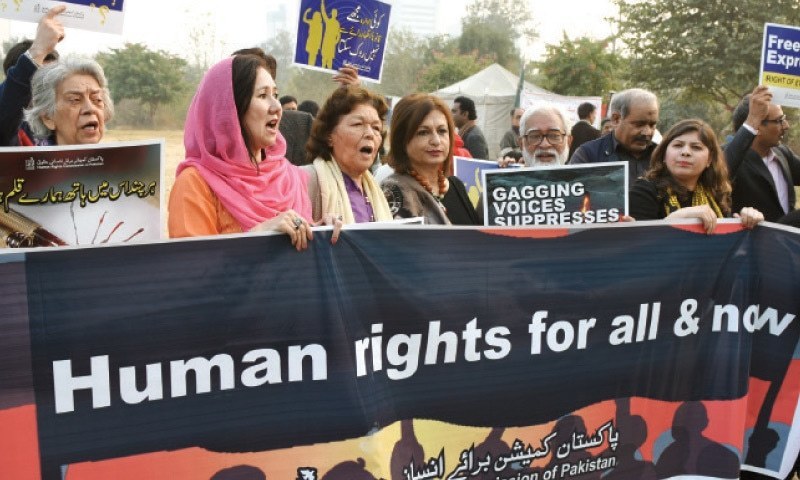
Pakistan may have been elected to the United Nations Human Rights Council (UNHRC) but it is fast becoming one of the most religious intolerant countries in the world with the state and its agents systematically targeting religious minorities with draconian laws and aggressive suppression.
In September 2020, a Senate committee rejected a bill calling for the protection of religious minorities and a member of the committee claimed that a bill for the protection of the rights of Muslims should be presented instead.
Religious minorities like Hindus, Christians and Sikhs have been targets of rabidly Sunni groups, most of them agents of the state, for long. Every year, scores of young women from these communities are abducted, raped and converted to Islam with their families running from pillar to post seeking redressal. The state’s complicity with criminals makes it impossible for either the girls or their families to find a just and fair closure to their trauma. The number of such heinous cases number over 1000 every year.
In its latest report, released in August 2020 the United States Commission on International Religious Freedom (USCIRF), has condemned Pakistan for the “systematic enforcement of blasphemy and anti-Ahmadiyya laws, and authorities’ failure to address forced conversions of religious minorities“,
The state targets the minority communities with a draconian law for blasphemy. Scores have been hounded out on wrong and malicious charges. Many remain incarcerated for years, awaiting final judgement which, in most cases, is a death sentence. Over 80 men and women remain in prison, with at least half facing a life sentence or death. In December 2019, after spending five years in solitary confinement for allegedly posting blasphemous content online, Junaid Hafeez was sentenced to death.
The Ahmadis, a minority sect among Muslims, has had the worst fate in a country purportedly to be for Muslims. Ever since Independence, Ahmadis have been labelled as heretics and denied any of the fundamental rights which other citizens, even other minorities, have access to.
Pakistan is one of the few Muslim countries in the world which has enacted laws against Muslims, especially against Ahmadis. For instance, the Constitution’s second amendment, added in 1974, declared Ahmadis as non-Muslims. Under articles 298(b) and 298 (c) of the Penal Code, the Ahmadis are prohibited from self- identifying as Muslims, propagating or disseminating materials about their faith, or calling their houses of worship, mosques. Ahmadis have even been imprisoned simply for sharing Ahmadiyya literature. They are prohibited from voting as Muslims and were previously denied registration under joint electoral lists, relegating them to separate electoral lists with less political power.
Some recent incidents are telling signs of the atrocities committed on minorities. In March 2019, a student murdered Professor Khalid Hameed in Bahawalpur, Punjab, for some alleged remarks against Islam. Protestors in Sindh attacked and burned Hindu shops and houses of worship following two incidents; in the first, a cleric accused a Hindu veterinarian of wrapping medicine with paper printed with Quranic verses; in the second, a student leveled blasphemy charges against a Hindu principal. A mob also attacked a Christian community in Punjab after a mosque claimed over its loudspeaker that the community had insulted Islam.
In another incident, nearly 200 Christian families in Karachi were forced to flee their homes due to mob attacks after false blasphemy accusations against four Christian women. In 2018, a student shot and killed his college principal on campus after accusing him of blasphemy in Charsadda city of Khyber Pakhtunkhwa province. The principal had scolded the student for missing classes to attend a protest organised by a right-wing Islamist group in Islamabad. In April 2017, Mashal Khan, a student, was beaten to death by his fellow students at his university campus in the Mardan region of Khyber Pakhtunkhwa province. Khan was accused of posting blasphemous materials on social media.
Besides the state agencies, vigilante groups, patronised by the state, hunt down those accused of blasphemy and since 1990, over 62 persons have been lynched as a result. Even lawyers defending those charged with blasphemy, presiding judges, and individuals speaking against the law are targeted. The judge, who sentenced to death the killer of Salmaan Taseer, Mumtaz Qadri, had to flee the country after pronouncing the judgement.
Only a few manage to escape the state’s dragnet. Asia Bibi, a Christian woman, was one of them who was set free by the Supreme Court. She fled the country soon after, escaping bloodthirsty fanatics who went on rampage in the streets of Pakistan against the judgement. The Asia Bibi case, however, has had its share of blood–first sitting Punjab Governor Salmaan Taseer was shot dead by his own guard for supporting Bibi’s freedom. Then, Pakistan’s Minister for Minority Affairs, Shahbaz Bhatti, a Christian, was shot dead for making similar remarks. This year, Asia Bibi’s brother was attacked by a group of armed goons in south Punjab and killed.
![]()





